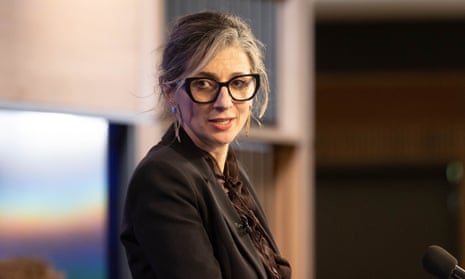Extract from The Guardian

Francesca Albanese said Australia had a responsibility under international law to join efforts to prevent war crimes, crimes against humanity and genocide.
UN special rapporteur on occupied Palestinian territories points out ‘grave risk’ of genocide and Australia’s responsibility to ‘prevent atrocity crimes’
Thu 16 Nov 2023 01.00 AEDT
Last modified on Thu 16 Nov 2023 01.02 AEDTFrancesca Albanese held talks with the assistant minister for foreign affairs, Tim Watts, on Wednesday and expressed her concern “as strongly as she could” about what she saw as Australia’s inadequate response to the escalating bloodshed in Gaza.
In an interview with Guardian Australia after the meeting, the UN special rapporteur on the occupied Palestinian territories said the government’s reluctance to openly criticise Israel was “not only unacceptable – it’s dangerous”.
“It just gives leeway to continuing these operations, [whereas] I think that if Israel is isolated in its stance it will be more difficult for Israel to continue this heavy bombardment of Gaza, which has killed so many,” she said at Parliament House.
Far from being a bystander on the other side of the world, Albanese said, Australia had its own responsibility under international law to join efforts to prevent war crimes, crimes against humanity and genocide.
“Australia should be consistent and coherent with its international law obligations,” the Italian lawyer said.
“The grave risk [of genocide] is there. And genocide, like other atrocity crimes, [is] not just there to be addressed through international tribunals once [it has] happened; [it should] be prevented.
“This is why we have these important conventions, and I don’t see, frankly, a robust engagement to prevent atrocity crimes.”
Albanese welcomed the meeting and believed Watts had “a pragmatic grasp of the situation”, although she was unsure whether the government would “embrace a paradigm shift premised upon international law”.
Albanese has previously been accused by Israel of bias, a charge she denies. The Israeli government has long demanded Albanese’s dismissal and refused to cooperate with her, contending that her language was symptomatic of an anti-Israeli mindset that underplayed the country’s legitimate security concerns.
The Israeli embassy in Canberra declined to comment on Wednesday, but the country’s ambassador to the UN, Gilad Erdan, said last month: “Israel is at war with the genocidal Hamas terrorist organisation … Hamas has only one goal – to annihilate Israel.”
The international criminal court is investigating both Israel and Hamas for alleged war crimes, but legal scholars say genocide is a harder crime to prove.
The 1948 Convention on the Prevention and Punishment of the Crime of Genocide defines it as covering acts “committed with intent to destroy, in whole or in part, a national, ethnical, racial or religious group”.
The convention’s first article requires signatories, which include Australia and the US, “to prevent and to punish” genocide. A New York civil liberties group has launched a lawsuit accusing the US government of failing in its duty to prevent Israel committing genocide in Gaza.
Albanese said that at this stage, “many of us do not feel capable of being conclusive” about whether Israel’s actions met the intent threshold, but she reiterated that Palestinians were at “grave risk” of genocide.
She said the Australian government – which has called for adherence to international law and has said the world will not accept continuing civilian deaths – should be “bolder”.
Albanese described the people of Gaza as “running from one place to another, with their kids in their arms and nothing left, trying not to be killed”.
Drawing parallels between the polarised debate in Australia and in her home country of Italy, Albanese said she “would love not to see this sort of football match situation [between] the pro-Palestinians and the pro-Israelis”, because people on both sides were “suffering tremendously”.
“We are all human beings, and should be able to recognise both the trauma and the pain and the legitimate aspirations to have rights recognised and respected,” she said.
“Both the Israelis and the Palestinians have those rights, so it shouldn’t be a zero-sum game.”
A number of prominent Jewish groups in Australia have rejected calls for a ceasefire, arguing that would amount to a victory for Hamas, which killed about 1,200 people in its attacks in southern Israel on 7 October and took more than 200 others hostage.
But more than 800 Jewish Australians have now signed an open letter urging the government to “call now for both the release of innocent hostages, and for a full ceasefire”.
“We reject the claim that the Australian Jewish community unanimously supports the actions of the Israeli government,” the letter said.
A spokesperson for Jewish Australians for a Ceasefire said there was “a loud and growing chorus of Jews around the world who desperately want a ceasefire”.
“Jews are not a monolith,” the spokesperson said.
“There are tectonic shifts under way in Jewish communities worldwide on this issue, especially among younger Jews.”
Additional reporting by Chris McGreal
No comments:
Post a Comment